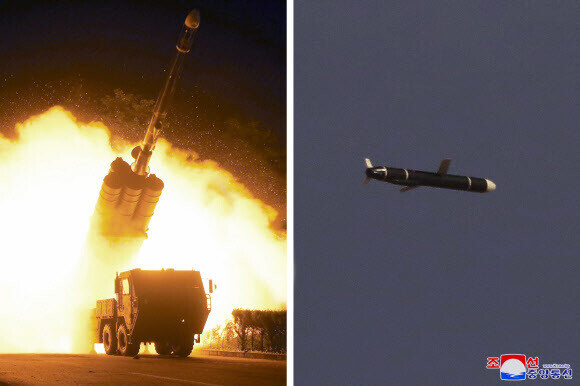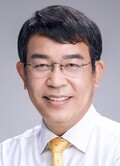hankyoreh
Links to other country sites 다른 나라 사이트 링크
[Column] Negotiating with N. Korea after its cruise missile tests


By Kim Jong-dae, visiting scholar at Yonsei Institute for North Korean Studies
An interesting episode is recounted in the book “Wired for War” by the warfare scholar P. W. Singer.
A US soldier in the Iraq War was in retreat when they realized they had left behind their robot device. The soldier risked their life venturing back into the combat zone to rescue the robot.
What was so special about that meter-tall hunk of metal that they would do such a thing? The commander was astonished at this ironic turn of events: a person protecting a robot, rather than the reverse. Singer writes that the robot had become anthropomorphized to the US soldier — that is, they had equated it with a fellow soldier who had taken a risk.
This sort of phenomenon becomes even more pronounced at the national level. During the Cold War, US nuclear weapons were seen as “angels” sent by God to protect the country. The weapons were worshiped, not just by clergy people but by quite a few ordinary Americans as well.
Such was the Cold War era: a time when armaments weren’t just personified, but deified. The legacy of that lives on in the way nuclear weapons stand as an unchanging national symbol of US dominance, and as a source of pride in being the country with the most powerful weapons of all.
Recently, North Korea restarted its Yongbyon nuclear reactor and showed off cruise missiles capable of flying 1,500 kilometers. These were the “corresponding measures” that it had warned of in response to joint military exercises between South Korea and the US.
Even if it wasn’t the kind of ballistic missile test that would violate UN Security Council resolutions, this cruise missile test was another milestone on the North’s path to complete nuclear armament.
If a miniature nuclear warhead can be attached to one of those missiles, it could be used to ward off US reinforcements sent to the Korean Peninsula from Japan’s Yokosuka or Okinawa in the event of an emergency. Pyongyang could also adopt an anti-access strategy of blocking US firepower from approaching the North.
If a ballistic missile is a fastball that the pitcher throws along a set straight-line path, then a cruise missile is a curveball that comes in slow and irregular. Just as a pitcher needs to have a curveball for their fastball to pack more of a punch, the cruise missile fills a supplementary role of boosting the ballistic missile’s strategic value.
At a Congress of the Workers’ Party of Korea (WPK) in January of this year, leader Kim Jong-un declared that North Korea would achieve tactical nuclear capabilities by improving the performance of its ordinary rockets and developing cruise missiles. The North is mixing up its repertoire with broader nuclear capabilities, marching toward that as a goal in itself.
In North Korea, nuclear weapons have evolved into something more than just strategic arms. They have become a transcendent strength that the regime must guard with its life.
In this sort of situation where North Korea is protecting its nuclear weapons rather than those weapons protecting North Korea, the likelihood of the peninsula’s denuclearization being realized decreases greatly.
Now that it possesses nuclear capabilities, denuclearization negotiations today will not resemble those from when the North was still developing such weapons. Improving relations with the North or supplying it with economic aid are unlikely to persuade it to give up its weapons; in reality, we can’t expect such tactics to do much more than to calm the nuclear-armed North and get it to keep its aggressive behavior in check.
As they stand on the brink of completion, North Korea’s nuclear weapons are a symbol of North Korean politics — sharing their destiny with the Kim Jong-un regime — and a venerated source of power. In that sense, it’s time for us to quit our wishful thinking that Pyongyang might give up its nukes if we treat it nicely.
If we hope to improve relationships with the North Korean regime, we don’t need to make that contingent on the Korean Peninsula’s denuclearization either. The more we try to push denuclearization on Pyongyang, the further we get from dialogue and the longer we spend not communicating. All that will come of goading North Korea is increased insecurity on the Korean Peninsula.
If anything, we put ourselves at a disadvantage when we fixate so much on North Korea’s denuclearization and reveal how anxious we are.
There’s also no need for us to fear a nuclear North Korea.
The North’s nuclear weapons are not something it could actually use in a war. Pyongyang is very much aware that using nuclear weapons would spell the downfall of its regime. In that sense, the balance of power on the Korean Peninsula puts North Korea at a disadvantage.
Even without nuclear weapons, the North boasts equally threatening long-range artillery, chemical weapons — the list goes on. That sort of conventional firepower is more likely to be used in actual warfare than nuclear weapons.
In that sense, we would do well to treat the nuclear matter as a long-term issue and focus our priorities more on humanitarian exchanges with North Korea and arms controls in terms of conventional firepower.
From a longer-term perspective, we must await the day when their faith that possessing nuclear weapons will make them “wealthy and strong” fades away.
This is the sort of dialogue that North Korea might agree to. White House Deputy Press Secretary Karine Jean-Pierre sent a hopeful message to Pyongyang when she said that “our position has not changed when it comes to North Korea — we remain prepared to engage.”
Please direct comments or questions to [english@hani.co.kr]

Editorial・opinion
![[Column] Has Korea, too, crossed the Rubicon on China? [Column] Has Korea, too, crossed the Rubicon on China?](https://flexible.img.hani.co.kr/flexible/normal/500/300/imgdb/original/2024/0419/9317135153409185.jpg) [Column] Has Korea, too, crossed the Rubicon on China?
[Column] Has Korea, too, crossed the Rubicon on China?![[Correspondent’s column] In Japan’s alliance with US, echoes of its past alliances with UK [Correspondent’s column] In Japan’s alliance with US, echoes of its past alliances with UK](https://flexible.img.hani.co.kr/flexible/normal/500/300/imgdb/original/2024/0419/2317135166563519.jpg) [Correspondent’s column] In Japan’s alliance with US, echoes of its past alliances with UK
[Correspondent’s column] In Japan’s alliance with US, echoes of its past alliances with UK- [Editorial] Does Yoon think the Korean public is wrong?
- [Editorial] As it bolsters its alliance with US, Japan must be accountable for past
- [Guest essay] Amending the Constitution is Yoon’s key to leaving office in public’s good graces
- [Editorial] 10 years on, lessons of Sewol tragedy must never be forgotten
- [Column] A death blow to Korea’s prosecutor politics
- [Correspondent’s column] The US and the end of Japanese pacifism
- [Guest essay] How Korea turned its trainee doctors into monsters
- [Guest essay] As someone who helped forge Seoul-Moscow ties, their status today troubles me
Most viewed articles
- 1[Column] The clock is ticking for Korea’s first lady
- 2Hong Se-hwa, voice for tolerance whose memoir of exile touched a chord, dies at 76
- 3After 2 months of delayed, denied medical care, Koreans worry worst may be yet to come
- 4[Column] Has Korea, too, crossed the Rubicon on China?
- 5[Correspondent’s column] In Japan’s alliance with US, echoes of its past alliances with UK
- 6US overtakes China as Korea’s top export market, prompting trade sanction jitters
- 7Samsung barricades office as unionized workers strike for better conditions
- 8All eyes on Xiaomi after it pulls off EV that Apple couldn’t
- 9More South Koreans, particularly the young, are leaving their religions
- 10John Linton, descendant of US missionaries and naturalized Korean citizen, to lead PPP’s reform effo